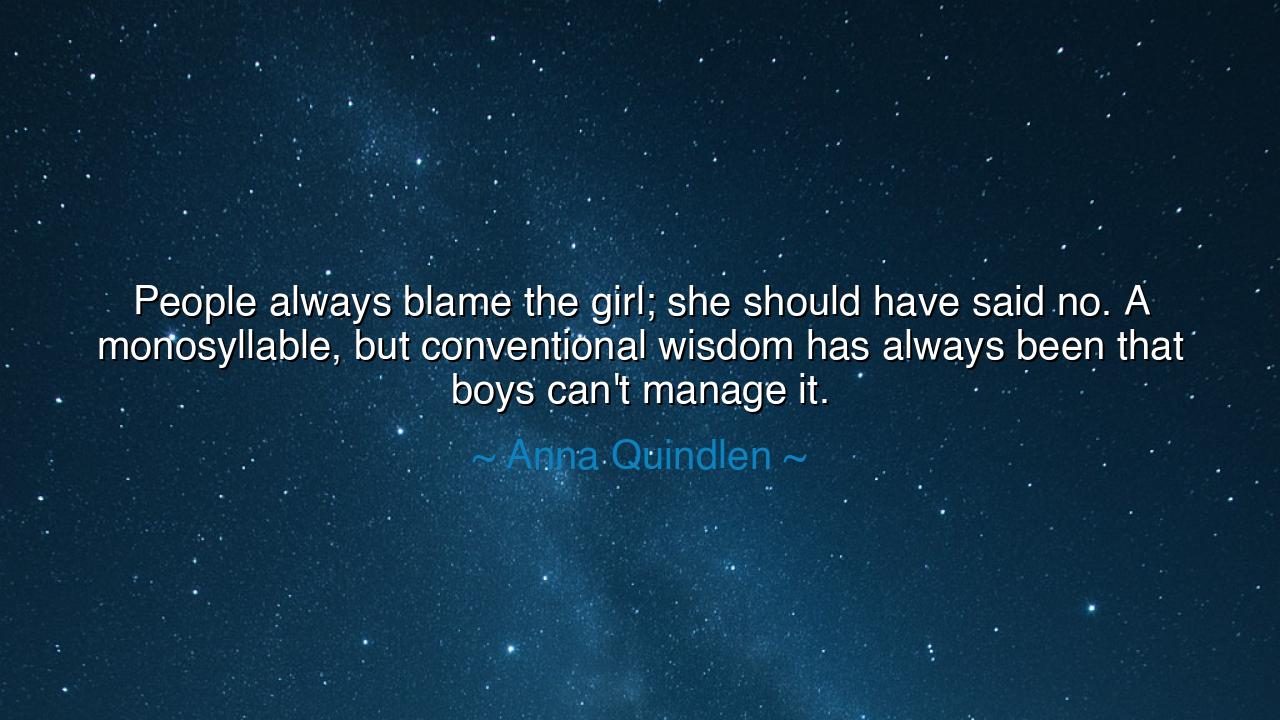
People always blame the girl; she should have said no. A
People always blame the girl; she should have said no. A monosyllable, but conventional wisdom has always been that boys can't manage it.






Anna Quindlen, voice of reason and champion of justice, speaks with profound clarity: “People always blame the girl; she should have said no. A monosyllable, but conventional wisdom has always been that boys can’t manage it.” In these words, she unearths an ancient injustice, one that has plagued humanity for centuries—blaming the victim instead of holding the perpetrator accountable. The conventional wisdom has long placed the burden of responsibility upon the one who is most vulnerable, perpetuating the false notion that boys—driven by primal instincts—cannot be trusted to exercise restraint. Quindlen’s words expose this as a dangerous lie, a distortion of justice that must be confronted.
The meaning is cutting and liberating. In every age, women have been told that their worth is bound to their ability to prevent the desires of men from going unchecked. "She should have said no" becomes a mantra, a finger pointed, blaming the girl for not stopping what is, in truth, an assault on her autonomy. Yet Quindlen calls this out, showing us the folly and the harm in such conventional wisdom. The true wisdom lies in recognizing that boys, like all men, must be taught to manage themselves, to exercise control over their impulses, and to honor the boundaries of others. The responsibility lies with the perpetrator, not the victim.
History is full of moments where this injustice was laid bare. Consider the rape trials of the past, where women, often in silence and shame, were forced to defend themselves against accusations of "temptation." In the eyes of many, the woman was always the one who had failed, never the man who acted in violence. This mindset has only shifted in recent times, when legal battles, such as those brought by the #MeToo movement, exposed how conventional wisdom had for so long allowed men to avoid accountability. Brave women like Tarana Burke and Dr. Christine Blasey Ford brought the fight to the forefront, refusing to accept the ancient script that placed blame on the victim.
Quindlen’s words echo the timeless struggle for equality and justice. For centuries, women have borne the weight of expectations that were never theirs to carry. And yet, the weight of these injustices has often been hidden in plain sight—wrapped in the fabric of what society accepted as "normal." In rejecting this false wisdom, Quindlen opens the door for a more just world, where both girls and boys are held to the same standards of respect, where the actions of men are scrutinized, and where women are empowered, not blamed.
Therefore, let the seeker of justice remember this: the world will always offer conventional wisdom to justify its inequalities, but it is the truth that must rise and challenge these falsehoods. Boys can and must manage their actions, and girls should never bear the burden of someone else's transgressions. The wisdom of the ages teaches us that justice cannot be built on the shoulders of the innocent, but upon the fairness of laws that hold all accountable.






VPVinh Pham
This perspective really forces me to confront how culture excuses male behavior under the guise of biology. The phrase ‘can’t manage it’ implies helplessness, but isn’t that just a learned form of entitlement? It’s unsettling to think how such beliefs have shaped laws, education, and personal relationships. How can we dismantle the myths of male impulse and female duty that perpetuate this imbalance of moral expectation?
PCThang Pham Cong
Reading this makes me feel both angry and reflective. The quote exposes how language and social norms intertwine to sustain inequality. When we tell girls to ‘just say no,’ we subtly reinforce the idea that it’s their job to prevent wrongdoing. I’d like to ask: what would happen if society started teaching both genders the same level of responsibility and emotional intelligence? Would blame finally shift toward fairness?
HGTran Hoang Gia
What stands out to me here is the sharp irony—how one word, ‘no,’ carries such heavy moral expectation for one gender and near absolution for the other. It raises questions about how early gender conditioning begins. Are boys still being raised to see desire as uncontrollable and girls as the gatekeepers of virtue? If so, what would it take to change that narrative across generations?
TNNhuyen thi tuyet nhung
I find this statement painfully accurate and socially relevant. It challenges the idea that consent is a one-sided duty. Why has culture normalized male lack of control as natural while demanding female restraint? That imbalance feels like an inherited cultural flaw. I wonder how much of this stems from outdated notions of masculinity and whether genuine equality can exist until emotional accountability becomes gender-neutral.
PTPhuong Thao
This quote hits hard because it exposes a deep-rooted double standard. Why is it that society so often puts the responsibility for boundaries on women while excusing men as victims of their impulses? It’s frustrating that gender expectations still dictate moral accountability. I’d like to ask whether this mindset is changing meaningfully, or if it just takes subtler forms today through victim-blaming disguised as ‘common sense.’